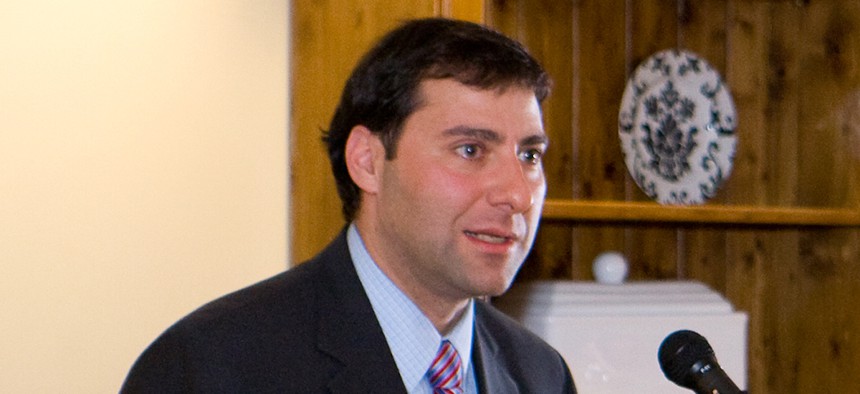
Vaughan Turekian speaks at USC at an event on science and diplomacy in 2010. USC via Flickr
State Science Adviser Resigns Early, Amid Departmental Reorganization
Vaughan Turekian’s early out sparks concern the position will be eliminated.
The science and technology adviser to the secretary of State has tendered his resignation, effective next week, Government Executive has learned. The resignation has sparked concern amid some in the science community that the position could be eliminated.
Vaughan Turekian, who began what is usually a three-year term in September 2015, will leave early and start next week as director for Science and Technology for Sustainability at the National Academy of Sciences, according to an email from the NAS executive director of policy and global affairs.
The move comes as Secretary of State Rex Tillerson is actively reorganizing the department and functioning with dozens of high-level vacancies.
A State spokesman would neither confirm nor deny the resignation or comment on whether Tillerson plans to appoint a successor. “The State Department is currently undergoing a design initiative and there are no predetermined outcomes,” the spokesman said. “During this process, we are committed to ensuring the department has access to the best science and technology to ensure we are addressing such issues in the most efficient way possible. We are not going to get ahead of any outcomes.”
Turekian did not respond to email inquiries. But his immediate predecessor, E. William Colglazier, now a senior scholar at the American Association for the Advancement of Science’s Center for Science Diplomacy, confirmed Turekian’s departure.
“Dr. Turekian did a superb job serving two secretaries,” Colglazier told Government Executive. “He and his office have been an asset for American diplomacy. I hope Secretary Tillerson retains this position in the reorganization and appoints a new science and technology adviser to the secretary.”
The position of State’s science adviser is a non-political appointment that goes for two years, with an option for a third. It was created in 2000 under then-Secretary Madeleine Albright based on a recommendation from the National Academies of Sciences, Engineering and Medicine. The adviser’s role is to brief the secretary of State and the undersecretary for economic growth, energy, and the environment on the international environment, science, technology, and health matters affecting foreign policy.
When Turekian arrived, the office laid out a three-pronged strategy for its mission that included “bringing to bear the vast resources of the U.S. science community to build science capacity across the department; promoting the role of science engagement for confidence building with countries and regions viewed as foreign policy priorities; and working with the deputy secretary and the [undersecretary for economic growth, energy, and the environment] and their staff to implement and build a coordinated science and technology innovation strategy so that the department can connect research, development and discovery generated within the high-tech and private sectors to foreign policy priorities.”
The position of undersecretary for economic growth, energy and the environment is currently vacant.
Turekian, a specialist in atmospheric chemistry, was previously chief international officer for the nonprofit AAAS and director of its Center for Science Diplomacy.
Asked whether the scientific community had concerns about Tillerson’s organization, Steven Aftergood, director of the Project on Government Secrecy at the Federation of American Scientists, said abolishing the science adviser position would be a “self-destructive move. If anything, the adviser's role in the department should be bolstered and expanded,” Aftergood said. “This should be done not for the sake of ‘science’ or scientists, but in order to advance the department's own agenda” in such areas as climate change, energy, environmental protection and economic development.
NEXT STORY: Senate Approves Trump’s Regulatory Chief







